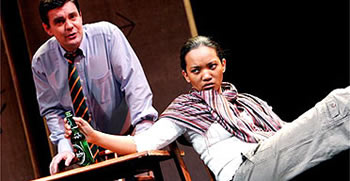
The Age of Terror
By Terry Stoller
Talking to Terrorists
The Arab-Israeli Cookbook
By Robin Soans
Royal Court Theatre, London
The Tricycle Theatre, London
(closed)
It was less than a week after the attempted
second bombing of London’s transportation system that I went to
the Royal Court to see Robin Soans’s documentary play Talking
to Terrorists. Nerves were raw all over London. Many London
theaters were conducting bag searches. The Royal Court went one
step further. It required patrons to check anything larger than
a small handbag. Perhaps the management felt that the very title
of the production might inspire violence. But while the theater
management was being pragmatic in the face of a contemporary crisis,
the artists were acting as humanists. The play had been a year
in the making, and director Max Stafford-Clark, in an April interview
with the BBC, said Talking to Terrorists was meant to
be an antidote to journalism’s focus on horrific events. It was
intended to present the context and to separate the people from
the acts. The idea that one must talk to terrorists and listen
to them is more than the inspiration for the project; it's also
a dictum repeated in the play.
Onstage, we are introduced to the stories
of former terrorists. They include an ex-member of the Irish Republican
Army, an ex-member of the Kurdish Workers Party and an ex-head
of al-Aqsa Martyrs Brigade who was deported to Ireland after the
siege of Bethlehem’s Church of the Nativity in 2002. Enlisted
into the various organizations as youths, they recount their initiation
into the ranks of the terrorist groups. An African girl was fleeing
violence at home; a young Irishman was following in his grandfather’s
footsteps; a Palestinian, whose childhood games included throwing
stones at pretend soldiers, was protecting his home and family.
In addition to the words of the ex-terrorists, there was testimony
from an Archbishop’s envoy who had been held hostage in Lebanon,
a British ambassador to Tashkent who had lost his post partly
because he protested torture and the violation of human rights
in the war on terror, and survivors of an IRA bombing—29 characters
in all.
Writer Robin Soans and director Stafford-Clark
are experienced in documentary drama, also known as verbatim theater
in England, separately and as collaborators. The production was
fast-paced and imaginatively staged on a minimalist set of rectangular
concrete slabs, a couple of doors and a table and chairs. It’s
common in verbatim theater to intercut the testimonies, a technique
that allows for an overall linear structure and breaks up what
might otherwise be long monologues. In this play, however, the
intercutting created some confusion, with jarring jumps in time,
place and event. And the practice of having actors take on multiple
roles compounded the confusion for me. An actress with a thick
non-British accent played two young girls—one an African who had
been kidnapped and forced to become part of a rebel band, the
other a Bethlehem schoolgirl, whose testimony was based on a published
diary. In performance, I didn’t realize until I checked the program
that these were two different girls.
With the London opening coming so soon
after 56 people had been killed and hundreds wounded by suicide
bombers, some critics found it difficult to empathize with the
play’s terrorists. Stafford-Clark defended the play’s intention
and reiterated in the pages of Time Out the importance
of letting terrorists have their say. I’m not sure that in the
middle of a trauma it’s possible to be understanding about why
people turn to violent acts, although the audience paid rapt attention.
As an American, I was offended by the end of the play. It was
taken from the Bethlehem schoolgirl’s diary, in which she writes
that the deaths of Americans in the Twin Towers made her happy
because it was Americans’ turn to suffer. The published script
ends with her saying: “I could see many thousands of them die.
I wouldn’t feel a thing.” By the time of the Royal Court performance,
however, that statement had been softened somewhat; the girl added
that she blamed the U.S. government, not the American people.
The production ended with mournful sounds of Middle Eastern chanting,
making it clear to me where the artists’ sympathies lay.
 Another
verbatim play by Soans, The Arab-Israeli Cookbook, was
presented in July at the Tricycle Theatre in north London. It’s
about coping with terrorism as part of everyday existence and
features more than 40 characters. In a variety of Arab and Israeli
kitchens, wonderfully designed for the multiple uses by Ben Stones,
the characters cooked, gave recipes for stuffed zucchini and hummus,
described the history of the Arab dish fattoush, and served up
treats. At the same time, in dark counterpoint, they talked about
the horrors of terrorist attacks, mourned the loss of loved ones,
and spoke of the hardships they bore as well as their fierce commitment
to that small piece of land in the Middle East.
Another
verbatim play by Soans, The Arab-Israeli Cookbook, was
presented in July at the Tricycle Theatre in north London. It’s
about coping with terrorism as part of everyday existence and
features more than 40 characters. In a variety of Arab and Israeli
kitchens, wonderfully designed for the multiple uses by Ben Stones,
the characters cooked, gave recipes for stuffed zucchini and hummus,
described the history of the Arab dish fattoush, and served up
treats. At the same time, in dark counterpoint, they talked about
the horrors of terrorist attacks, mourned the loss of loved ones,
and spoke of the hardships they bore as well as their fierce commitment
to that small piece of land in the Middle East.
As in Talking to Terrorists, the
actors spoke directly to the audience, making us bear witness
to their stories. There were light-hearted moments too. In the
intimate space of the Tricycle’s courtyard auditorium, actors
played with the audience, to its delight, offering a luscious
olive and showing a prize collection of alcohol.
The stories of the daily struggles of Arabs
and Israelis were gathered in 2003 by Soans along with directors
Tim Roseman and Rima Brihi, who first mounted the production at
London’s Gate Theatre in 2004. The piece tries to be evenhanded,
presenting points of view from both sides. I was particularly
moved by the elderly Palestinian couple who chose to stay close
to home rather than suffer the humiliations of being stopped and
searched at Israeli checkpoints. In another Palestinian household,
a family kept the memory of a son eerily alive by watching a video
of his struggle against the Israeli army during the intifada,
afterward viewing the footage of his funeral. An Israeli bus driver,
movingly played by actor Nicholas Woodeson, talked of being haunted
by guilt for having followed security regulations on the day of
a suicide bombing, which meant that he ignored his instincts and
didn’t stop to help a driver whose bus had just exploded. His
guilt was deepened by the knowledge that his bus might have been
the one that was bombed had he not been two minutes late to work
that day.
The play ends with the completion of a
chicken dish that’s going to be served with a pomegranate-and-fig
salad—and a prayer for peace. It’s true that The Arab-Israeli
Cookbook, with its life-affirming emphasis on food, was easier
to appreciate than Talking to Terrorists, with its focus
on rage and despair. But both productions importantly offered
multiple points of view of what it’s like to live in the age of
terror.
